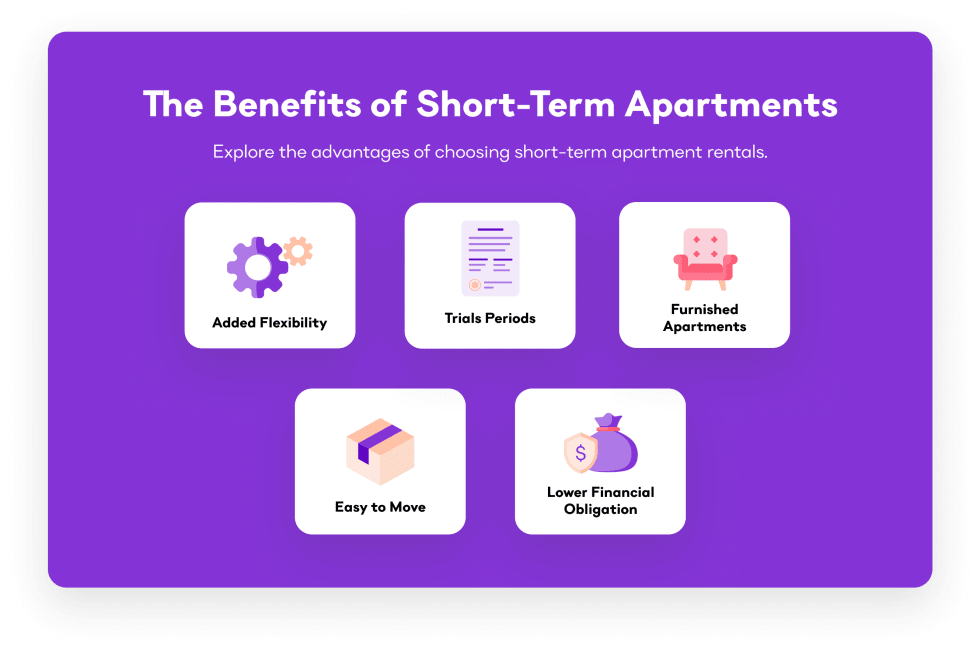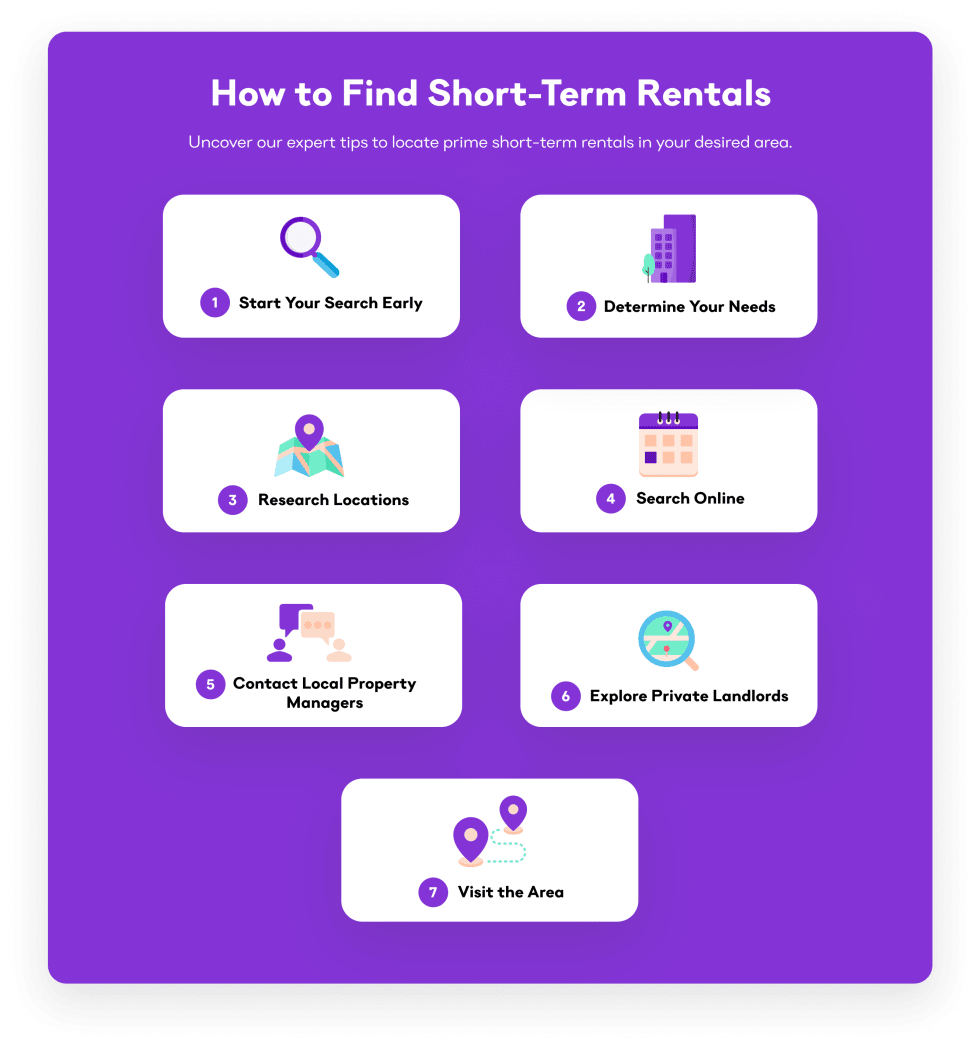How to Find Short-Term Apartment Rentals

Short-term apartment rentals can be a great option depending on your circumstances. If you need a temporary home and have the budget for a slightly pricier place, then you don't always have to get locked into a 12-month lease just to rent an apartment.
In this guide, we’ll explain everything you need to know about short-term apartments, including the pros and cons of short-term rentals and how to find short-term rentals near you. Let’s dive in!
A Guide to Short-Term Rentals
What Are Short-Term Rentals?
A short-term rental is any apartment that has a lease that's shorter than the typical 12-months. Apartments that offer traditional 12-month leases may also offer short-term lease options, so you should always inquire with your prospective landlord about lease length.
Generally, short-term rentals are intended as a stop-gap for renters who prefer not to commit to a long-term lease.

How Long Is a Short-Term Lease?
Common lease lengths for short-term rentals are three or six months. However, there are even shorter lease terms, like month-to-month apartments. It's also possible to find places that will rent week-to-week.
Although long-term lease agreements allow for more stability, many short-term renters are looking for more flexible accommodations. However, flexibility comes at a price.
What Are the Pros and Cons of Short-Term Rentals?
Short-term rentals certainly have their advantages. However, it’s important to have a full picture of what they can offer you before making a final decision.
What Are the Advantages of Short-Term Apartment Rentals?
The pros of short-term rentals include added flexibility, the ability to safely explore a new area, and the ability to rent a full-furnished apartment.
- Added Flexibility: Short-term lease agreements free renters from the commitment of a year-long lease, allowing you to move after a few months without incurring extra fees.
- Explore a New Area: If you’re moving to a new state and want to get to know the area before making a long-term commitment to a home, a short-term rental is a great option. It’ll also give you a great opportunity to search for jobs in the area and attend interviews in-person.
- Furnished Apartments: Short-term apartments often come furnished. This will save you the hassle of moving furniture when you move in and when your lease term is up.
The pros of short-term rentals can outweigh the cons for many people because of the added flexibility and overall ease that comes with these types of apartments. However, there are important cons to consider before making a final decision.

What Are the Disadvantages of Short-Term Apartment Rentals?
The disadvantages of short-term rentals include cost, rarity, and the fact that they are so transitory.
- More Expensive: Short-term rentals will almost always have more expensive monthly rent than a 12-month lease. This is because landlords have to offset the loss of 12 full months of rent and the time it takes to find another renter when you end your lease.
- Harder to Find: Short-term leases are hard to find because they aren’t as lucrative as long-term rentals and generally cause landlords more hassle. Set aside plenty of time to find a short-term rental _before _making your move.
- Moving More Often: Shorter leases means moving more often. Moving costs can add up quickly, and moving is generally a stressful experience. Not to mention, you’ll have to apartment hunt all over again.
- Can Negatively Impact Credit: If you rent multiple short-term rentals in a short period, each hard pull on your credit can negatively impact your credit score.
The disadvantages of short-term rentals make them less appealing to renters looking for stability and lower monthly rent. But if you have the time to search and the budget to support your move, this could be the option for you.

What Are the Legal Requirements for Short-Term Apartment Rentals?
Short-term apartment rentals have the same legal requirements as any apartment rental except that your lease will be less than twelve months or on a month-to-month basis. You may also be expected to pay a higher rate. Finally, it may be easier to find no credit-check apartments available for short-term leases, meaning that the landlord may waive a standard credit check.
How Do I Find Short-Term Rentals Near Me?

Using Apartment List to find short-term rentals near you is simple. When you’re setting up your Apartment List renter profile, you have the option to add the duration of a lease you’re looking for. You can select any length of time between 1 and 24 months, in addition to other information such as number of bedrooms, bathrooms, and locations.
We make it easy to search for apartments based on the lease length and city that’s right for you!
If you aren't looking online or already have an apartment complex in mind, you can always inquire with an apartment's leasing office or landlor about your options for short-term leases.
How Do I Find Short-Term Rentals that Allow Pets?
When you use Apartment List to find apartments, there are options for both short-term rentals and places that allow pets. We offer selections for both "Dogs" and "Cats," which you can change anytime by visiting your profile.
Find a Short Term Rental That's Perfect for You
A lot can happen in a year. There can be so many changes that it can be difficult to predict where you'll be 12 months. We understand that committing to a standard long-term lease isn't always the best option.
A short-term lease can offer the flexible living situation that you’re looking for. Just be sure that your budget can handle the cost of a short-term rental. Prepare for your search and make sure you have a good case to plead to your prospective landlord.
To get started on your short-term rental search, just take our quiz!
Frequently Asked Questions
How Long Can You Stay in a Short-Term Rental?
Tenants typically stay the length of their short-term lease, for example, 1, 3, or 6 months. However, if you decide to stay longer, it is often possible to renew your short-term lease much as you would with a traditional 12-month lease. Just be sure to inquire with your landlord as soon as you know you would like to extend your lease.
With month-to-month rentals, the lease will typically renew each month until either you or your landlord decides to terminate the rental agreement.
What is a Short Term Rental in NYC?
In NYC, a short-term rental is a special designation for lease agreements fewer than 30 days. Landlords wishing to rent to tenants for periods shorter than 30 days through a platform like VRBO or AirBnB are required to register with the Office of Special Enforcement.
Is 3 Months Considered Short-Term?
Any lease less than 12 months is considered short term, and a 3 month lease is one common lenght of time for a short-term lease. 1, 6, and 9 month leases are also popular in the short term.
How do I Get a Refund for a Short-Term Apartment Rental?
When you sign a lease, it is usually not possible to get a refund unless you use a platform such as VRBO or AirBnB. However, if you were unable to use your apartment due to damages or other issues, and you believe you are entitled to compensation because you incurred losses as a result, you may be able to take your landlord to court to recover your rent.
Share this Article





